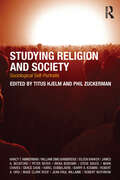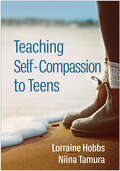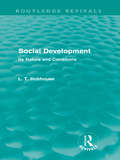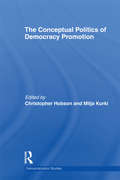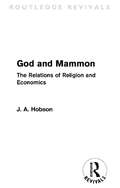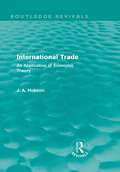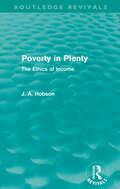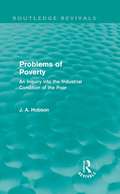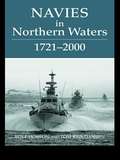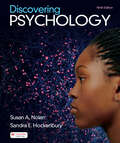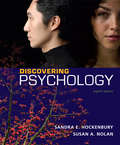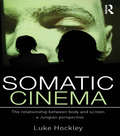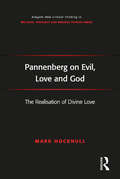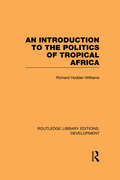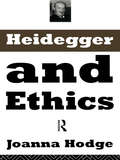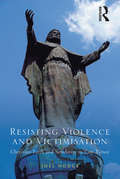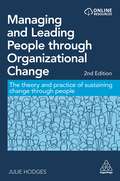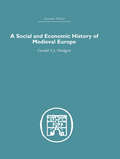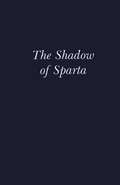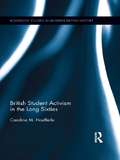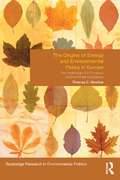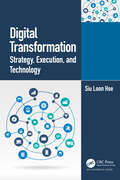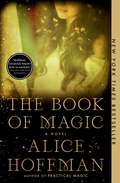Special Collections
Benetech’s Global Certified Accessible Titles
Description: Benetech’s GCA program is the first independent third-party EPUB certification to verify ebook accessibility. By creating content that is born accessible, publishers can meet the needs of all readers. Learn more: https://bornaccessible.benetech.org/
- Table View
- List View
Studying Religion and Society
by Phil Zuckerman and Titus HjelmHow do you study religion and society? In this fascinating book, some of the most famous names in the field explain how they go about their everyday work of studying religions in the field. They explain how the ideas for their projects and books have come together, how their understanding of religion has changed over the years, and how their own beliefs have affected their work. They also comment on the changing nature of the field, the ideas which they regard as most important, and those which have not stood the test of time. Lastly they offer advice to young scholars, and suggest what needs to be done to enable the field to grow and develop further.
Teaching Self-Compassion to Teens
by Lorraine Hobbs and Niina TamuraGrounded in knowledge about the unique developmental challenges of adolescence, this book presents an innovative approach for teaching self-compassion to teens and young adults in clinical, educational, or community settings. Lorraine Hobbs and Niina Tamura provide guided practices, creative exercises, and teaching strategies adapted from Kristin Neff and Christopher Germer&’s widely disseminated Mindful Self-Compassion program for adults. Case examples, sample dialogues, and scripts illustrate how to set up and run successful groups that address teen concerns such as self-criticism, self-esteem, social comparison, and strong emotions. The book offers guidelines for cultivating a personal practice and working with parents. Tips for providing a safe, effective learning environment are woven throughout; a special chapter covers trauma-sensitive teaching.
Social Development
by L. T. HobhouseOriginally published in 1924, Professor Hobhouse's theories and commentaries upon social development are an important milestone in the history of sociological thought. Of particular interest to the modern sociologist is his delineation of the struggle of the human mind towards rationality in thought and action and his insistence on the principle that in all social investigations it is necessary to distinguish between questions of fact and questions of value.
The Conceptual Politics of Democracy Promotion
by Milja Kurki and Christopher HobsonHow do different meanings of the concept of ‘democracy’ operate in democracy promotion? How do conceptual decisions influence real political events? How is policy and reflection on democracy promotion shaped by the way different practitioners and scholars understand democracy? The Conceptual Politics of Democracy Promotion explores the way in which the meaning, content and context of ‘democracy’ are interpreted by different actors in democracy promotion, and how these influence political decisions. Introducing a theoretically new approach to the study of democracy promotion, the volume shows how the alternate ways that democracy can be understood reflects specific interpretations of political and normative ideals, as well as being closely tied to social power relations, interests, and struggles between political actors. With original contributions from some of the most prominent specialists on democracy promotion and democratization, the book examines a number of concrete cases of democracy promotion and contestation over democracy’s meaning. Re-examining democracy promotion at its time of crisis, this book will be of interest scholars and students of democracy and democratization, politics and international relations, international law, development studies and political theory.
God and Mammon
by J. A. HobsonFirst published in 1931, this is an attempt by the great economist J. A. Hobson to analyse the relations between economics and religion. After considering the origins of the conflicts and compromises between God and Mammon in the life of primitive man, the author concerns himself primarily with medieval and modern Christianity and the business climate and ethos corresponding with these periods. In particular he focuses upon Catholicism and Protestantism, before considering the attitude of the church towards modern economic movements.
International Trade
by J. A. HobsonFirst published in 1904, this important economic work explores some of the leading principles underlining the development of international trade. Hobson offered a departure from the conventional treatment of international trade in economic theory, simplifying concepts of free trade, exchange and tariffs and considering the practical application of theory in a manner accessible to the reader.
Poverty in Plenty
by J. A. HobsonFirst published in 1931, this Routledge Revivals title reissues J.A Hobson’s analysis of financial distribution in the early years of Twentieth Century Britain. The book focuses on the moral questions that he considered to be important in regard to the economic reforms that were necessary to secure the utilisation of modern productivity for the welfare of mankind. In this work, Hobson considers the wasteful working of the economic system, with its over-production, under-consumption and unemployment and states that these errors are due to the unfair way in which income is apportioned among the nations, classes and individuals that produce it. Poverty in Plenty argues for a conscious economic government inspired by a sense of justice and humanity. It makes suggestions towards the establishment of such a government and presents business prosperity as a problem of morals.
Problems of Poverty
by J. A. HobsonFirst published in 1891, this seminal work examines the primary causes of poverty during the industrial age. Through considering how poverty is measured, the growth of urbanisation and the supply of low-skilled labour in the workforce, Hobson arrives at possible solutions to the problem of poverty and explores the ethical issues surrounding it.
Navies in Northern Waters
by Rolf Hobson and Tom KristiansenNavies in Northern Waters is a collection of articles covering the roles played by the secondary navies of northern European powers and the United States within the maritime balance of power. The contributions covering the 18th and 19th centuries focus on their relations with each other as they sought to create a counterweight to the dominant naval power of Britain. The inter-war years are treated from the perspectives of international disarmament efforts within the framework of collective security, and the subsequent naval rivalry in the Baltic area in the years leading up to the Second World War. For the post-1945 period, the contributions concentrate on superpower rivalry in northern waters during the Cold War, the changing aspects of security policy since the collapse of the Soviet Union and the particular challenges facing small coastal states policing extensive waters of increasing economic importance.
Discovering Psychology
by Sandra E. Hockenbury and Susan A. NolanDiscovering Psychology is the most effective book available for helping students develop scientific literacy and explore the real impact of psychology across the breadth of cultural diversity.
Discovering Psychology
by Sandra E. Hockenbury and Susan A. NolanSandra Hockenbury and new coauthor Susan Nolan’s remarkable textbook is grounded in the belief that all kinds of students can develop a real understanding of psychology and lasting scientific literacy.
The authors act on that belief by using relatable personal stories to communicate the concepts of psychological science (and the process of science itself), and by presenting important research in a clear not oversimplified way.
Hockenbury and Nolan also take full advantage of online learning, creating activities in LaunchPad that have students thinking about psychology as scientists do.
New co-author, Susan Nolan of Seton Hall University was recently designated a Master Teacher by the Society for Teaching Psychology. She regularly gives talks about incorporating scientific literacy into the introductory course and across the psychology curriculum.
Somatic Cinema
by Luke HockleyFilms can hold personal psychological meanings that are often at odds with their narratives. Examining the intersections between mental health and the cinema, Somatic Cinema represents the cutting edge of film theory, evaluating the significance of this phenomenon both in therapy and in the everyday world. Luke Hockley draws on the insights of phenomenological and Jungian film theory and applies them alongside more established psychoanalytic approaches. The result is to combine the idea of affective bodily experience with unconscious processes as a means to explore a new ontology of the cinema. The emphasis is therefore shifted from pure intellectual insight to greater inclusion of personally constructed meanings and experiences. Several key concepts are developed and explored throughout the book. These include: The idea of the ‘Third Image’, occupying the intersubjective space between viewer and screen, and therapist and client The concept of the Cinematic Frame (as opposed to the Film Frame), the container of the psychological relationship between viewer and screen The use of the Cinematic Experience to encapsulate the somatic expression of unconscious effects that develop while a film is viewed and which are central to the creation of personal psychological meanings. With a focus on examining why we develop a personal relationship with films, Somatic Cinema is ideal for academics and students of film studies, media studies and analytical psychology.
Dream On
by Angie HockmanIn this fresh romantic comedy from the author of Shipped, heralded as an &“absolutely sparkling debut&” by Entertainment Weekly, a woman wakes up from a car accident with memories of a boyfriend she&’s never met...only to run into him a year later. Perfect for fans of Christina Lauren and Rebecca Serle.What would you do if your dream man turned out to be real? When law grad Cass Walker wakes up after surviving a car accident, she is flooded with memories of a man named Devin. The only problem? Devin—as confirmed by family, friends, and doctors—doesn&’t exist. Everything about him, from his coffee-brown eyes to the slightly crooked angle of his pinkie to his high-wattage charm, is a figment of Cass&’s coma-addled imagination. Still, she can&’t get him out of her head. So when she happens upon the real Devin a year later in a Cleveland flower shop, she&’s completely shocked. Even more surprising is that Devin actually believes her story, and despite his protective younger brother&’s doubts, they soon embark on a real-life romance. With her dream man by her side and a new job at a prestigious law firm, Cass&’s future seems perfect. But fate might have other plans... From the beloved author of Shipped comes a magical and witty romantic comedy that explores what happens when our dreams come true—even when they&’re not the ones we expect.
Pannenberg on Evil, Love and God
by Mark HocknullPannenberg on Evil, Love and God examines a much-neglected aspect of the theological thought of one of the most original contemporary German theologians, Wolfhart Pannenberg: his theological and philosophical understanding of evil and its relationship to the love of God. The book seeks to correct a widely held misconception that in his theology, Pannenberg has neglected the darker side of the world, concentrating instead on an optimistic picture of the future. This book argues that questions of evil hold a central place throughout Pannenberg’s writing and seeks to draw out the implications of his wrestling with these issues. The Introduction sets the scene by considering the nature of the question of evil and argues that a theological response must be made as part of a global view of the world and not in isolation from other themes. The succeeding chapters develop this theme through a reading of Pannenberg’s theology.
An Introduction to the Politics of Tropical Africa
by Richard Hodder-WilliamsThis wide-ranging and informative introduction to politics in tropical Africa, first published in 1984, is essential reading to students, businessmen, government officials and economic advisers alike. Situating the contemporary scene firmly in its historical context, which stresses both pre-colonial and colonial heritages, he emphasizes how politicians are constrained by the past, the physical environment and the world’s economy, yet still retain freedom of choice on a wide range of issues. The book is thematically organised and provides both an overview of the general similarities of the continent and also enough detail to flesh out the realities of tribalism and corruption, as well as illustrating the variations that inevitably occur in a continent of sovereign states.
Heidegger and Ethics
by Joanna HodgeHeidegger and ethics is a contentious conjunction of terms. Martin Heidegger himself rejected the notion of ethics, while his endorsement of Nazism is widely seen as unethical. This major new study examines the complex and controversial issues involved in bringing them together.By working backwards through his work, from his 1964 claim that philosophy has been completed to Being and Time, his first major work, Joanna Hodge questions Heidegger's denial that his enquires were concerned with ethics. She discovers a form of ethics in Heidegger's thinking which elucidates his important distinction between metaphysics and philosophy. Against many contemporary views, she proposes therefore that ethics can be retrieved and questions the relation between ethics and metaphysics that Heidegger had made so pervasive.
Resisting Violence and Victimisation
by Joel HodgeThe reality and nature of religious faith raises difficult questions for the modern world; questions that re-present themselves when faith has grown under the most challenging circumstances. In East Timor widespread Christian faith emerged when suffering and violence were inflicted on the people by the state. This book seeks a deeper understanding of faith and violence, exploring how Christian faith and solidarity affected the hope and resistance of the East Timorese under Indonesian occupation in their response to state-sanctioned violence. Joel Hodge argues for an understanding of Christian faith as a relational phenomenon that provides personal and collective tools to resist violence. Grounded in the work of mimetic theorist René Girard, Hodge contends that the experience of victimisation in East Timor led to an important identification with Jesus Christ as self-giving victim and formed a distinctive communal and ecclesial solidarity. The Catholic Church opened spaces of resistance and communion that allowed the Timorese to imagine and live beyond the violence and death perpetrated by the Indonesian regime. Presenting the East Timorese stories under occupation and Girard's insights in dialogue, this book offers fresh perspectives on the Christian Church's ecclesiology and mission.
Managing and Leading People through Organizational Change
by Dr Julie HodgesChange in organizations is all about people: it is people who plan, prepare for and implement change, and who are affected by it in the daily course of their work. Yet there is a tendency to focus on quantifiable and often more easily solved technical aspects of implementing organizational change programmes, and ignore the complex ways that these will impact individuals. Providing an evidence-based analysis of change in organizations, Managing and Leading People Through Organizational Change is written for practitioners responsible for change programmes and postgraduate students of organizational change. This updated edition demonstrates the importance of understanding the effects of change on individuals and engaging them collaboratively through the transformation journey. Featuring new material on individual wellbeing and the impact of technological advances on the workplace, this book sets out frameworks, practical approaches and recommendations for communicating with and leading individuals, teams and organizations through change. Full of exercises, interviews and case studies from across the globe, this book is an essential resource for leaders and students enabling them to achieve sustainable benefits of change at work.
A Social and Economic History of Medieval Europe
by Gerald A. HodgettThis excellent and concise summary of the social and economic history of Europe in the Middle Ages examines the changing patterns and developments in agriculture, commerce, trade, industry and transport that took place during the millennium between the fall of the Roman Empire and the discovery of the New World. After outlining the trends in demography, prices, rent, and wages and in the patterns of settlement and cultivation, the author also summarizes the basic research done in the last twenty-five years in many aspects of the social and economic history of medieval Europe, citing French, German and Italian works as well as English. Significantly, this study surveys the present state of discussion on a number of on unresolved issues and controversies, and in some areas suggests common sense answers. Some of the problems of economic growth, or the lack of it, are looked at in the light of current theories in sociology and economic thought. This classic text, first published in 1972, makes a useful and interesting general introduction for students of medieval and economic history.
The Shadow of Sparta
by Anton Powell and Stephen HodkinsonIn the past twenty years the study of Sparta has come of age. Images prevalent earlier in the 20th century, of Spartans as hearty good fellows or scarlet-cloaked automata, have been superseded by more complex scholarly reactions. As interest has grown in the self-images projected by this most secretive of Greek cities, increasing attention has focused on how individual Greek writers from other states reacted to information, or disinformation about Sparta.The studies in this volume provide new insights into the traditional historians' question, "What actually happened at Sparta?". But the implications of the work go far beyond Laconia. They concern preoccupations of some of the most studied of Greek writers, and help towards an understanding of how Athenians defined the achievment, or the failure, of their own city.
After Sustainable Cities?
by Simon Marvin and Mike HodsonA sustainable city has been defined in many ways. Yet, the most common understanding is a vision of the city that is able to meet the needs of the present without compromising the ability of future generations to meet their own needs. Central to this vision are two ideas: cities should meet social needs, especially of the poor, and not exceed the ability of the global environment to meet needs.After Sustainable Cities critically reviews what has happened to these priorities and asks whether these social commitments have been abandoned in a period of austerity governance and climate change and replaced by a darker and unfair city. This book provides the first comprehensive and comparative analysis of the new eco-logics reshaping conventional sustainable cities discourse and environmental priorities of cities in both the global north and south. The dominant discourse on sustainable cities, with a commitment to intergenerational equity, social justice and global responsibility, has come under increasing pressure. Under conditions of global ecological change, international financial and economic crisis and austerity governance new eco-logics are entering the urban sustainability lexicon – climate change, green growth, smart growth, resilience and vulnerability, ecological security. This book explores how these new eco-logics reshape our understanding of equity, justice and global responsibility, and how these more technologically and economically driven themes resonate and dissonate with conventional sustainable cities discourse. This book provides a warning that a more technologically driven and narrowly constructed economic agenda is driving ecological policy and weakening previous commitment to social justice and equity. After Sustainable Cities brings together leading researchers to provide a critical examination of these new logics and identity what sort of city is now emerging, as well as consider the longer-term implication on sustainable cities research and policy.
British Student Activism in the Long Sixties
by Caroline HoefferleBased on empirical evidence derived from university and national archives across the country and interviews with participants, British Student Activism in the Long Sixties reconstructs the world of university students in the 1960s and 1970s. Student accounts are placed within the context of a wide variety of primary and secondary sources from across Britain and the world, making this project the first book-length history of the British student movement to employ literary and theoretical frameworks which differentiate it from most other histories of student activism to date. Globalization, especially of mass communications, made British students aware of global problems such as the threat of nuclear weapons, the Vietnam War, racism, sexism and injustice. British students applied these global ideas to their own unique circumstances, using their intellectual traditions and political theories which resulted in unique outcomes. British student activists effectively gained support from students, staff, and workers for their struggle for student’s rights to unionize, freely assemble and speak, and participate in university decision-making. Their campaigns effectively raised public awareness of these issues and contributed to significant national decisions in many considerable areas.
The Origins of Energy and Environmental Policy in Europe
by Thomas C. HoerberThis book examines the development of a European environmental conscience through successive steps of European integration in energy policy. In the 1960s-70s, the world was slowly beginning to realise that environment degradation was not sustainable. With phenomena such as acid rain, it became clear that pollution did not stop at national boundaries and the European environmental conscience developed in parallel to such growing environmental concerns. The oil crisis in 1973 was a turning point in the integration process for both energy policy and environment policy, and while further integration towards the European energy policy failed; the environmental policies took shape in measures such as energy saving. The Commission incorporated both energy and environmental policies into the EU policy canon and built an institutional framework, responding to the insufficiency of national policy answers and the developing environmental conscience of the European people. This book will be of interest to students and scholars of European Integration, European Union politics and history and environmental politics and policy.
Digital Transformation
by Siu Loon HoeDigital transformation is a multidimensional concept and involves many moving parts. Successful digital transformation requires a fresh approach to harnessing people, processes, technology, and data to develop new business models and digital ecosystems. One main barrier could be an overemphasis on applying technology to expand the business rather than transforming the people’s mindsets to do things differently. Thus, it is important to develop a holistic view of these parts and assemble them to foster the right conditions for digital transformation to happen. Business leaders and executives must be equipped with a wide range of digital competencies to thrive in a rapidly changing digital environment. Digital Transformation: Strategy, Execution, and Technology provides an overall view on the strategy, execution, and technology for organizations aiming to transform digitally. It offers insights on how to become more successful in the digital age by explaining the importance and relevance of the various building blocks which form the foundation of a digital organization. It shows the reader how to develop these building blocks in the organization as part of the digital transformation journey from both a business and technical perspective. Highlights of the book include: Digital transformation strategy Digital governance and risk management Digital organization and change management Experimental learning and design thinking Digital product management Agile and DevSecOps Digital enterprise architecture Business applications of digital technology This practical guide is written keeping business and information technology professionals and digital transformation practitioners in mind. It is also suitable for students pursuing postgraduate degrees and participants attending executive education programs in business and information technology.
The Book of Magic
by Alice HoffmanMaster storyteller Alice Hoffman brings us the conclusion of the Practical Magic series in a spellbinding and enchanting final Owens novel brimming with lyric beauty and vivid characters.
The Owens family has been cursed in matters of love for over three-hundred years but all of that is about to change. The novel begins in a library, the best place for a story to be conjured, when beloved aunt Jet Owens hears the deathwatch beetle and knows she has only seven days to live. Jet is not the only one in danger—the curse is already at work.
A frantic attempt to save a young man’s life spurs three generations of the Owens women, and one long-lost brother, to use their unusual gifts to break the curse as they travel from Paris to London to the English countryside where their ancestor Maria Owens first practiced the Unnamed Art. The younger generation discovers secrets that have been hidden from them in matters of both magic and love by Sally, their fiercely protective mother.
As Kylie Owens uncovers the truth about who she is and what her own dark powers are, her aunt Franny comes to understand that she is ready to sacrifice everything for her family, and Sally Owens realizes that she is willing to give up everything for love.
The Book of Magic is a breathtaking conclusion that celebrates mothers and daughters, sisters and brothers, and anyone who has ever been in love.
